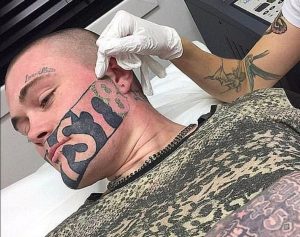In this powerful story that highlights the impact of social media and second chances, a young man from New Zealand named Mark Cropp found himself facing a difficult turning point in life after serving a two-year and three-month sentence for a failed drug deal. Mark, like many young people who’ve made serious mistakes, hoped for a fresh start after prison. But what he did while behind bars ended up haunting him more than his criminal record.

During his incarceration, Mark longed for a different life. One night in his jail cell, while heavily intoxicated on a homemade alcoholic concoction made from fermented apples, bread, and sugar, he and his brother made a spontaneous and deeply consequential decision. That night, in a state of drunken bravado, they used improvised tools and makeshift ink—created from toothpaste and melted plastic utensils—to tattoo Mark’s face. The result was a bold, black tattoo that read “Devast8,” scrawled across his jawline and lower face. At the time, it seemed like a rebellious act or perhaps a symbolic gesture reflecting his pain. But it didn’t take long for Mark to realize that this ink would become a lasting symbol of regret.
Once he was released from prison, Mark eagerly wanted to rebuild his life. He had a partner and a young daughter he needed to support, and he was determined to find stable employment and become a responsible father and citizen. However, as he began the job search, he was met with constant rejection. Despite his past work experience and sincere desire to turn his life around, employers would take one look at his face and immediately dismiss him as a potential hire. The “Devast8” tattoo was simply too jarring and gave off the wrong impression. It overshadowed everything else about him.
Mark later opened up in an interview with Daily Mail Australia about the meaning behind the tattoo. He explained that during a rough period in his life, he felt like everything he touched fell apart. “You know there was a long time there where I would devastate everything I touched,” he said. “I would end up devastating everyone I met or got close to. They would be disappointed with something I had done or said – I was always hearing ‘that’s devastating.’” As the ink began to take shape that night in prison, Mark said he realized he didn’t really want it, but felt it was too late to stop. “Once it was started, I thought, I can’t go back on it now. I wish I had stopped while the outline was there, to be quite honest.” The morning after the tattoo was finished, his face was swollen and painful. “Before I knew it I had this on my face… It was swollen like a bloody pumpkin.”
Trapped in a cycle of rejection and financial stress, Mark began to lose hope. He desperately wanted the tattoo removed, but there was a problem—laser removal was expensive, and he couldn’t afford the multiple sessions it required. Nor could he find anyone willing to take on the job for free. At this point, he felt backed into a corner. With few options left, Mark decided to turn to social media in a final plea for help.
He posted a selfie on Facebook showing the striking tattoo, along with a heartfelt message asking for work and a fresh start. It was a raw, vulnerable moment, and it quickly captured attention. Users across the platform began to share his story, expressing sympathy and support. His post went viral, and eventually, it caught the eye of the staff at Sacred Tattoo, a respected tattoo parlor based in Auckland.
The team at Sacred Tattoo was deeply moved by Mark’s story. They understood the weight of his mistake and the sincerity of his desire to change. Wanting to help him get back on his feet, they decided to offer Mark free laser removal treatments. It was an extraordinary act of kindness—one that not only gave Mark hope but also served as a powerful reminder of how social media can be used for good.
For Sacred Tattoo, this wasn’t just about erasing ink from someone’s face. It was about giving a man a second chance, offering him the opportunity to move forward without the burden of a mistake that was literally etched into his skin. The gesture also inspired many others who saw the story unfold online, proving that a community’s compassion can make all the difference in someone’s life.
But the good news didn’t stop there. Thanks to the visibility his story received online, Mark was offered a job with PR Contracting, a scaffolding company that believed in giving people opportunities based on who they are now—not who they were in the past. The company hired him at $22 an hour, giving him the chance to support his family and rebuild his confidence.
Mark’s journey is a poignant example of how the choices we make can shape our lives, but also how those same lives can be reshaped through courage, honesty, and the kindness of others. It’s easy to judge someone based on appearance or past mistakes, but stories like Mark’s challenge us to look deeper—to recognize the human being behind the ink, behind the headlines, and behind the regrets.
Everyone makes mistakes. But not everyone gets a shot at redemption. Mark’s story reminds us of the importance of second chances and the incredible power of community. It shows that transformation is possible when people are willing to step forward, not just to ask for help, but to offer it.
So, what do you think about Mark’s story? Do you believe everyone deserves a second chance, no matter what they’ve done in the past? Let us know your thoughts—because stories like these are worth discussing.





